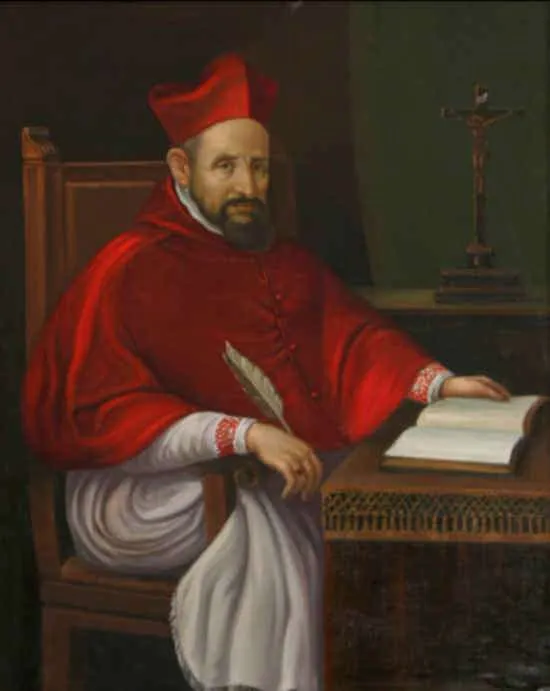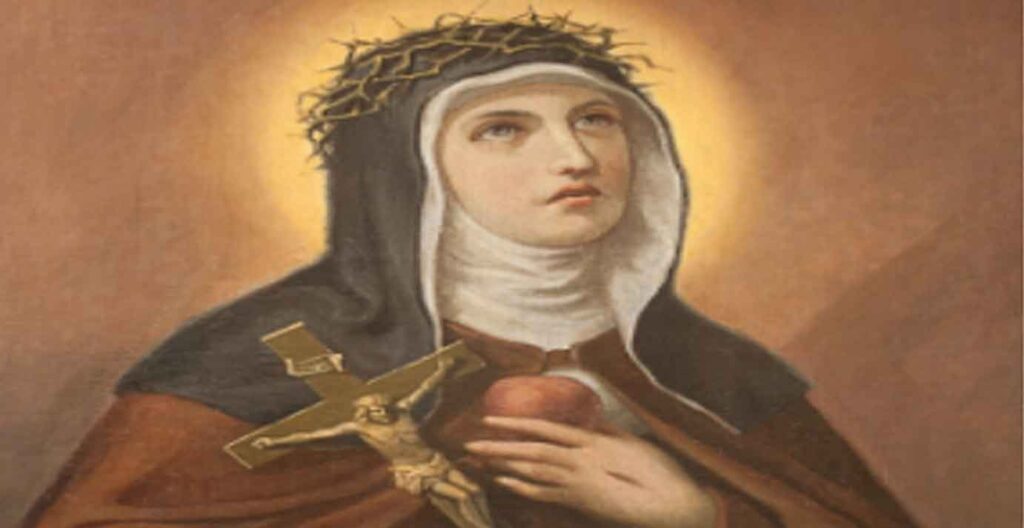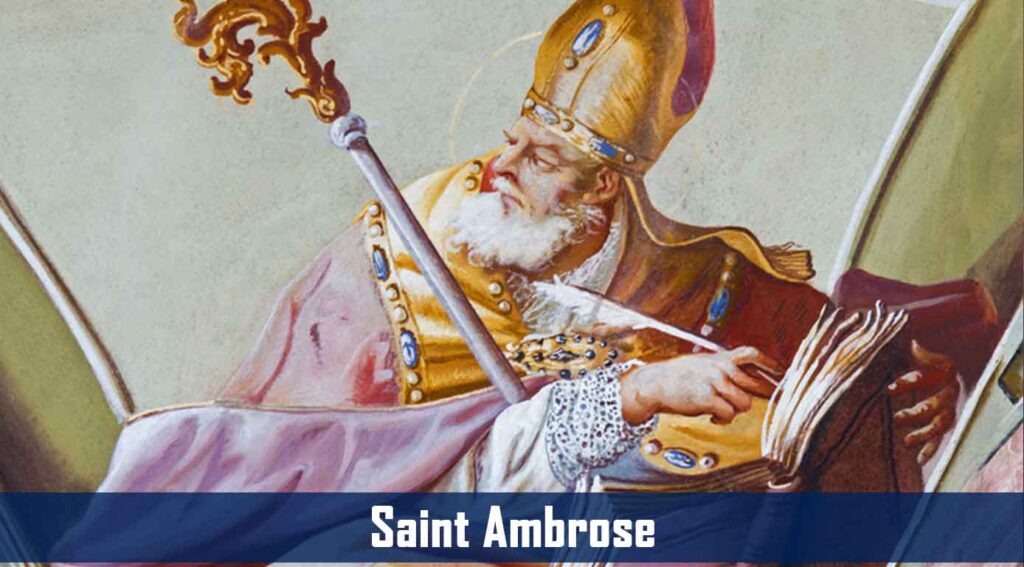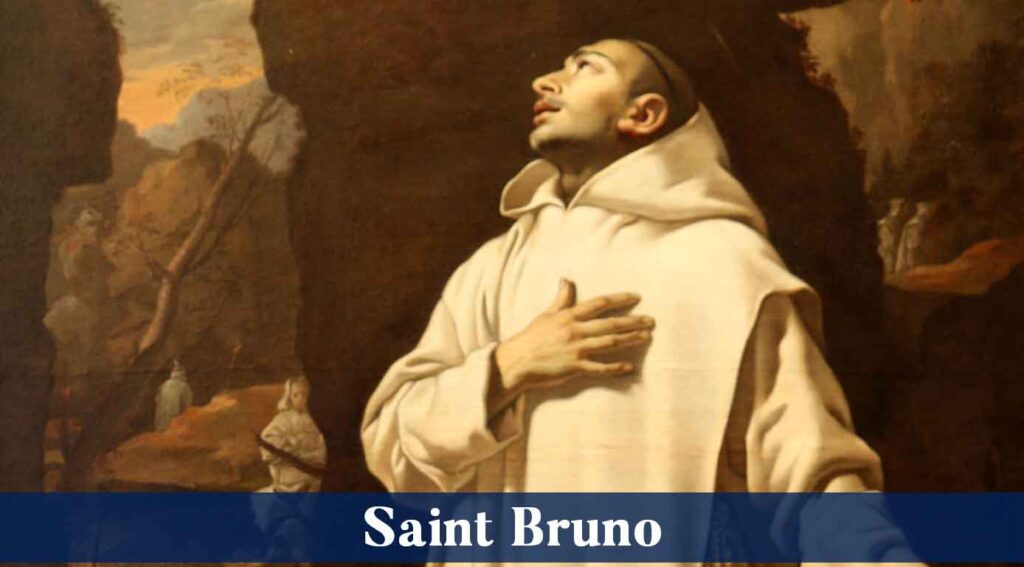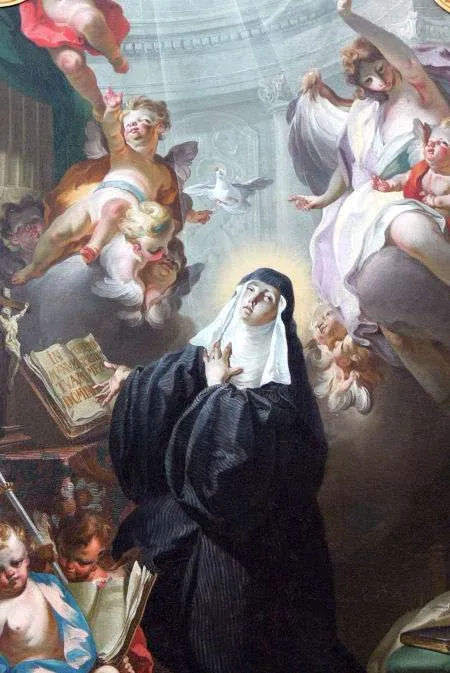1542–1621; Patron Saint of canon lawyers, catechism writers, catechists, and catechumens; Canonized by Pope Pius XI in 1930; Declared a Doctor of the Church by Pope Pius XI in 1931
Robert Bellarmine was the third of ten children born into a noble family in the town of Montepulciano within the Grand Duchy of Tuscany, modern-day Italy, about 100 miles north of Rome. Despite the family’s noble lineage, Robert’s parents were materially poor. When Robert was born, his uncle, Marcello Cervini degli Spannocchi, was a cardinal. When Robert was thirteen, his uncle was elected Pope Marcellus II, but quickly fell ill and died only twenty-two days later.
As a child, Robert was known for his intelligence. He was thought to have had a photographic memory, quickly memorizing pages of books and poems, such as Virgil’s poems in Latin. At the age of eighteen, he entered the Jesuit novitiate in Rome where he excelled. A few years later, when he was asked to teach Greek, which he did not know, he learned it with his students and quickly mastered the language as he taught it. His theological studies immersed him in the scholastic theology of Thomism. He studied in Padua and then Louvain, modern-day Belgium, where he was ordained a priest in 1570 at the age of twenty-eight.
As a newly ordained priest, Father Bellarmine was assigned to teach at the University of Louvain, where he had just completed his theological studies. After six years of teaching there, he was assigned to teach at the Roman College, now the Pontifical Gregorian University in Rome. It was there that he became a spiritual director and confessor to the seminarian and future saint, Aloysius Gonzaga.
Both in Louvain and in Rome, Father Bellarmine became widely respected for his brilliance and preaching. While in Rome, Father Bellarmine’s lectures turned into a three-volume book called De Controversiis, a defense of the Catholic faith in the wake of the Protestant Reformation. Father Bellarmine addressed seventeen controversies that resulted from the Protestant Reformation, and he powerfully and eloquently defended Catholic doctrine against them. This was the first attempt by a Catholic theologian to directly address these controversies in a systematic and comprehensive way. His work became the standard for the theological defense of the faith across all of Europe. Topics included Scripture and Tradition, Christ, the pope and Church, the Sacraments, sin, grace, free will, and good works. Not only did he present the Catholic faith well, he also addressed the errors of Luther, Calvin, Zwigli, and others who were sowing confusion within the Protestant Reformation. Unquestionably, he was the holy hero that was sorely needed in the Church at that time.
In addition to his writing, teaching, and preaching, Father Bellarmine was called upon by popes for administrative and diplomatic tasks. In 1592, at the age of fifty, he was assigned as rector of the Roman College. In 1598, he was created a cardinal and given the role of Cardinal Inquisitor, which required him to serve as a judge in important matters of the Inquisition, such as trials for heresy. During his tenure, he participated in the trial of the former Dominican turned Calvinist, Giordano Bruno, who was found guilty and turned over to the civil authorities, who put him to death.
In 1602 Cardinal Bellarmine was ordained a bishop by Pope Clement VIII and assigned as Archbishop of Capua. When Pope Clement VIII died three years later, Cardinal Bellarmine was among the cardinal-electors and received some votes. Cardinal Alessandro de’ Medici was ultimately elected and chose the name Pope Leo XI, but died twenty-six days later. In the next conclave, Cardinal Bellarmine narrowly escaped being elected, much to his relief. Cardinal Camillo Borghese was chosen instead, taking the name Pope Paul V. Pope Paul V, in keeping with the mandates of the Council of Trent, ordered that the bishops who were living in Rome needed to return to their dioceses to fulfill their duty as shepherds. However, he asked Cardinal Bellarmine to stay, to which he obediently agreed. He resigned his archbishopric and became a prominent member of the Holy Office and other congregations and was the chief advisor and theologian for the Holy See.
Over the next sixteen years, Cardinal Bellarmine became a central figure in the Vatican. He helped resolve divisions within the Church, clarified the Church’s position on relevant topics, helped implement the use of the recently published Roman Catechism, or Catechism of Trent (which he had earlier helped to write), communicated with and even rebuked kings and secular rulers, and served in numerous other capacities. In 1616, Cardinal Bellarmine was involved in responding to the controversial teachings of Galileo, whom he considered a friend. Though the cardinal did not condemn him, he did deliver the Church’s position that, since Galileo’s conclusions could not be substantiated scientifically, the traditional understanding of Scripture must hold. He also explained that if science were to prove Galileo’s view (that the earth revolved around the sun), then the Church had a duty to interpret the Scripture in light of those new facts. It wasn’t until after Bellarmine’s death that the Church went further, erroneously condemning Galileo, much to its later humiliation.
After one more conclave, Cardinal Bellarmine fell ill and retreated into retirement. During these last years of his life, he wrote some beautiful devotional works: “The Mind’s Ascent to God by the Ladder of Created Things,” “The Seven Words on the Cross,” and “On the Art of Dying Well.” His other earlier works include a masterful commentary on the Psalms, the earlier mentioned De Controversiis, his contribution to the Roman Catechism, as well as several other minor works.
Saint Robert Bellarmine was naturally gifted with a brilliant mind. What made him a saint is that he devoted himself and every natural ability to the service and glory of God. God took that offering and did great things through him. As we honor this brilliant and holy saint, ponder the importance of offering to God the gifts and talents you have. What are you good at? What are you capable of? No matter what that is, offer yourself to God and commit yourself to becoming a holy instrument for His eternal glory.
Source: https://mycatholic.life/saints/saints-of-the-liturgical-year/september-17—saint-robert-bellarmine-bishop-and-doctor–optional-memorial/


